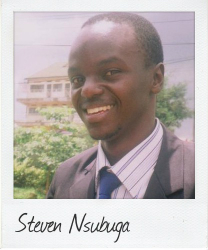"Rap music and Uganda’s youth vote"
February 28
Uganda’s President, Yoweri Museveni, won re-election earlier this month with the help of a rather unconventional election tactic, writes 26-year-old Steven Nsubuga from Kampala.
Uganda has during this month of February been buzzing with election preparations and campaigns for the presidential, parliamentary and local council elections.
Naturally the presidential campaign generated the greatest amount of interest, with the incumbent Mr Yoweri Museveni taking on seven challengers, led by third time contestant Mr Kiiza Besigye.
Seeing as the election is now consigned to the annals of history, let me go ahead to inform all those not in the know that the incumbent won with about 68% of the vote. I would like to add my voice to those congratulating the winner, asking him to be humble in victory and urging the losers to be graceful in defeat.
At the time the campaign kicked off, it seemed like this was going to be one unforgettable election period, climaxing with the presidential election on February 18th.
One of the key issues that all the candidates could not ignore was the plight of the youth. The incumbent was well aware of just how important this segment of the population was; many of these first time voters were born during his regime and would take some convincing.
Previously, to ensure a majority vote, all Mr Museveni had to do was to remind the voters of the deplorable days before he swept into power in 1986. However, this line was not going to swing the youth vote because they were not around in those dark days.
This time around, the high costs of university education and high unemployment rate were among some of the issues affecting the youth.
Many of the president’s opponents during the campaign made the claim that he was “tired” and that a fresh mind was needed to take the country to the next level. The youth vote was crucial and a potential game changer; a brilliant masterstroke was required not to lose it.
Cue the presidential rap.
Mr Museveni showed his rivals how false their claims were when he rapped the lyrics of a traditional folk song, sending almost the entire country into frenzy. No one had seen it coming – not his rivals, certainly not the youth, but they loved it and loved him for it.
His campaign team organised for some musicians to add some modern beats to the rap, and a hit was made, with the song getting a lot of airplay and becoming a campaign slogan. “You want another rap” became the signature song for Mr Museveni. The challengers tried to downplay the rap, but to no avail.
It is trivial to think that a mere rap swayed the youth vote, but considering that all the candidates made near-identical promises and pledges to the youth, it is hard to downplay the importance of the rap, for at least it did show that the incumbent still had a sharp mind and was not “tired”.
One thing that all candidates should target is convincing all the registered voters to turn up and cast their votes.
According to the Electoral Commission, there are 13.4 million registered voters, and at the end of the tallying it was found that 8.2 million of the total registered voters took part in the election. Mr Museveni garnered 5,428,369 of those votes, with the nearest challenger Mr Besigye amassing 2,064,963 votes. According to the figures from the EC, only 59.29% of the registered voters took part in the voting process, meaning 41.71% of eligible voters did not turn up.
It is not hard to see that their presence could have changed the complexion of the results. Even discounting some of them as having been outside Uganda at the time, it is likely that they were a significant number.
Many people claimed to have been tired of the status quo and advocated for change but strangely did not turn up to vote!!
Some of them claimed that the result of the election was never in doubt and that the incumbent would undoubtedly rig the election. Thus, they opted to complain instead of showing up to speak with their vote.
It is hard to think of a reason why one would neglect their civic duty, and while a figure of 59.29% cannot be described as low, it does make me wonder what might have been if the turn up had been higher.
It is my plea that we all give democracy a chance by turning up to play our part by casting our vote.



